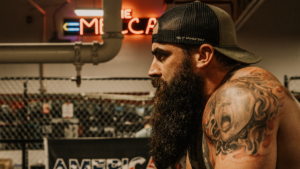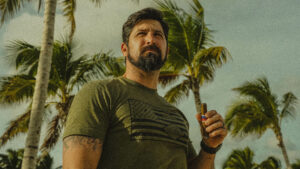ELLIOT HULSE IS MAKING MEN STRONG AGAIN
- Jack Donovan
- July 6, 2024
- Interviews

Elliot Hulse, photographed by Jack Donovan. 2021.
This interview was originally published in the CHEST magazine project in 2022.
Elliot Hulse made a name for himself when he opened his first Strength Camp gym and started promoting strongman-style strength training on YouTube in 2007.
Since then, strongman competitions have grown and become more popular. I remember being interested in strongman training myself around that time — back when I was delivering exercise equipment — and there were far fewer resources available. You could mail-order some molds for making cement stones, or get ideas from books that became classics in the genre like Dinosaur Training from Brooks D. Kubik. Strongman training at that time was kind of a fringe, DIY subculture for men.
Strongman training reaches back to the primal roots of strength training — back before everything seemed to revolve around dumbbells and barbells, and long before exercise machines as we know them today were even a twinkle in anyone’s eye.
You can imagine a group of guys in Ancient Greece or in Scotland, or just a bunch of cavemen standing around shooting the breeze.
“I bet I can lift that big rock.”
“I bet I can lift that rock and carry it father than you.”
“Well, I bet I can lift that log over my head.”
And they did, and there’s evidence of traditions like stone and log lifting all around the world.
One can imagine that the guy who lost the bet went out into the woods every day for the next six weeks and lifted that stone or that log over and over again until he knew he could beat some of the other guys in the next competition. Perhaps that is the true and natural genesis of strength training.
A lot of young men were and are hungry for that kind of primal physical experience. Hulse tapped into that because it was something he enjoyed and excelled at doing, and over time he found himself becoming a kind of mentor and father figure within that growing community of men.
Over several years, his YouTube channel blew up to over a million subscribers, and a lot of what he found himself doing was answering questions about fitness, but also about life and philosophy.
Hulse told me that one of the things he really enjoyed doing at his gym was hanging out with the young men at his gym after their workouts.
“They asked me questions, because they trusted me, about life, relationships, careers, family, and things of [that] nature. And apparently, they benefitted greatly from hearing my insights on things outside the gym.”
So he started a second YouTube channel devoted to answering questions about life outside the gym, and that also gained almost a million subscribers.
“And now, here I am sitting as a washed-up old strongman strength coach who posits as a father figure to perhaps millions of men worldwide.”
Hulse is a big personality online. High energy and right up in your face. I remember hoping that he wasn’t that way in person. I met Elliott for the first time at the 21 Convention in 2019. That online personality is obviously part of who he is, and when you get him started talking about something about which he is passionate — you definitely get that energy and authority. But Hulse is also polite and pensive and generous. He has mature, grounded confidence. He’s not the kind of guy who has to “big-dog” a whole room.
I snapped the photos for this article quickly in the “green room” at the 21 Convention in 2021. Hulse was in “guru mode” when I met him in 2019. But in 2021, he was looking bigger in preparation for his first strongman competition in years. His presence was stylish and athletic, and his wife was at the conference with him. I’ll also say that I thought Hulse appeared to be especially…happy. I reached out to him in early 2022 to conduct the actual interview for this article online.
The Joy of Being a Brute
Hulse got into strongman training — and eventually competing, coaching, and YouTube — because he played football in high school and college and learned that he really enjoyed “smashing heads.”
“It was such a joy to be a brute!”
“That’s what I’m built to do. I’m like a Mack truck. I like to smash myself and smash into things.”
When that came to an end, Hulse said he felt a little lost for a while, until he discovered strongman training and eventually got his pro card in 2010. Strongman is a little less predictable than sets and reps under a bar, and Hulse thinks his YouTube audience grew because he was always doing something different — flipping tires one day and pulling a truck the next.
He kept filming and competing and winning until he popped his bicep and stopped competing. That’s when Hulse decided he could make a bigger impact by going “all-in” on the Internet.
The Mid-Life Opportunity
Between age 30 and 40, Hulse said he was busy building a family and a brand and a business, but around 40, he stopped to re-evaluate.
“They like to call it a mid-life crisis, and maybe it is in a way, but it is also an opportunity to take a look at your life. I took a look at my life from a helicopter view, and had to come to peace with the things that weren’t going to be, and I had to be realistic about the things that I am called to be. So I revived my love for lifting again. I can do it. It’s a gift. Why not exercise the gifts God gave me? So I decided to go back into strongman training and I competed last year for the first time as one of the “masters” — that’s what they call the old guys.”
Elliott said he was nervous about competing again after so many years, and at 5’9”/220#, he found himself surrounded once again by much larger men. But he said he “wiped the floor with them” and “zipped through everything” and figured “this is what I am supposed to be doing.”
Hulse thinks he’s going to continue competing in strongman, perhaps once a year.
“I want to be OLD. I want to have gray hair and a big, long beard and still be jacked and lifting stones.”
Hulse has a collection of atlas stones ranging from 100 pounds to 300 pounds, but he says there is one right in the middle — a 220-pound stone — that he has his eye on.
“Well into my old age, maybe 80-year-old Elliott, I want to be able to pick up that stone and put it on my shoulder.”
On Becoming a Leader of Men
We talked about his evolution from being a strength coach into becoming a leader of men, and the responsibility that comes with that. Hulse said that he got carried away with it for a while and convinced himself that he was changing men’s lives — which he absolutely does — and changing the world. But eventually, he felt that he was becoming prideful and needed to humble himself, and he wanted to make it clear that, at the end of the day, he’s just a man.
“I give my opinion on stuff. That’s what I do.”
Hulse also felt the weight and the responsibility that comes with being a leader, and he wants to make sure he’s leading men in the right direction.
“When I die, it’s true that God’ is going to judge me, and he’s going to say, ‘Look, you had all these guys — and THIS is where you led them?”
“We are suffering as a people because men are weak, men have been feminized, men have been subverted in their powers in the home and in the world.”
Hulse explained that because of this dire situation, the sentiment that motivates his work of “answering questions and giving opinions” is his belief that we can only restore what is lacking in the world today by “making men strong again.”
Estranged from Our Own Nature
I asked him what problems he encounters most with younger men, but he made the point that so much of the confusion he sees in young men today is a consequence of the breakdown of the family. They’re confused because their fathers weren’t present, or they were effeminate or incompetent. He attributes this to the proliferation of communist ideology in the West after the Bolshevik revolution. “If you want to break down the power structures in the home, you make women hate men.”
While men are often accused of misogyny, Hulse said he doesn’t see a lot of it out there. He admits that there are some angry men — some of them justifiably angry about what has been done to the family and the country — but Hulse believes that we see far more misandry than true misogyny in the world today.
“We’re living in a matriarchal world, where men are trained to think in a gynocentric, pro-feminist way — which, number one, is not attractive to women at all. It destroys relationships, it destroys the authority structure that is important to any organization”
“Men are so estranged from our own nature.”
Hulse credits much of his understanding of this to having been lucky enough to grow up with an “alpha male dad.” Elliott’s father is from Belize and he “grew up in the jungle.” His father grew up around manly men who “climbed trees and killed things.” Elliot’s father wasn’t indoctrinated in the school systems with “all the garbage that keeps us weak.” Elliott was, however, and when he was younger, he said that he resented his father and thought he was some kind of caveman.
Hulse said he couldn’t relate to his father or really understand him until he was in his late twenties or early thirties. He slowly started to realize that, “I and everyone else had this backwards, and my dad’s been right the entire time.”
“Some people said I had become toxic, but really, I’ve atoned with my father and recognized who I really am, and this is what the world needs: strong fathers.”
On Raising Daughters
Elliott Hulse has one son, but he also has three daughters, and he had some thoughts about raising daughters in our upside-down world with a patriarchal mindset, “without making them hate me.” He told me that he prides himself on creating an environment where his daughters can learn to be like their mother, who he described as a great wife and a great mother to her children.
Elliott chuckled and told me that he has some selfish motives involved in his work with young men. “There’s no way I’m going to send my daughters off with any of these weak, weird men.”
Hulse says part of what he is doing is “planting seeds” in a generation of men, so that hopefully some of them will make good husbands for his daughters.
He also observed that so many alpha male men, “raise their daughters to compete with men. So they raise their daughters to be alpha women. They’re doing a total disservice to men. by teaching your daughter that “you don’t need any man.”
“Hold on buddy. That’s not your son. You want to do us a favor here by allowing your daughter to be feminine. Especially in a world that’s so anti-sexual polarity — because it’s anti-male and it’s anti-female. As much as it is gynocentric, it’s not feminine. It’s a perverted form of female nature that they’re promoting. And so, if we’re going to get this all right, it can’t just be us men making men strong, somebody, somewhere, at some point has to make these women wife-worthy.”
I asked him about some of the challenges he’s encountered in the process of raising daughters, and he said that the primary challenge was dealing with the prevailing culture.
“Everywhere you look, every movie you watch, every series on Netflix, every song you hear sung, everywhere you look — it’s feminists and feminism. It’s teaching men how to be effeminate and teaching women how to be feminists.”
Hulse explained that part of the problem is the way that people from the 1960s forward have been trained to see generations laterally instead of vertically — identifying primarily with their same-age peers instead of their parents, ancestors, and extended families.
“Children feel the need to separate themselves from the vertical integration of the family. There was a time before this idea of “generations” when a son would want to behave more like his father and grandfather because there was wisdom there. Now it is a matter of ‘this is what my friends are doing, this is what the movies are doing, this is the Zeitgeist is all about — and my parents are dumb.’”
He says his strategy for combatting all of the ideological propaganda slipped into cartoons and entertainment and the attempts to turn children against their parents is to point it out immediately when he sees it, and talk about it with them.
“A lot of dads leave the raising of their daughters up to their mothers. We don’t know what to do — they don’t even know how to be men, so they don’t want to interfere with these girls. But we need to be able to understand the enemy and point it out to our children. I would hear my daughter say certain things — and I’d say ‘whoah, I know you heard that on a YouTube video and that’s what your friends are saying, but you have to understand that that’s not realistic and you have to understand that is in fact a form of ideological subversion meant to destroy your psyche and your soul and ultimately your life because that doesn’t work in a family.”
“With my daughters especially, I plant the seed that family is the most important thing that you will achieve in your life.”
He noted that they also see bad examples in their friends’ homes, and he believes it’s important to point that out, too.
We ended our discussion with some shop talk about censorship. Hulse says he’s been banned and shadow-banned and de-monetized on several platforms. But he said he realizes that the idea that we get to use these platforms and advertising channels for free to disseminate our messages is fairly new. People always had to “pay to play,” and he is working on investing in other channels and outlets so that, no matter what happens, he can keep making men strong.

It Would Be Cooler If We All Stood Together Against Tyranny

Living the Dream with Anthony “Dream” Johnson
Related Post
Ian Smith – On Manhood and Resistance
- Posted July 6, 2024
- by Jack Donovan
Aubrey Huff – Alpha American
- Posted July 6, 2024
- by Jack Donovan
John Lovell
- Posted July 6, 2024
- by Jack Donovan


